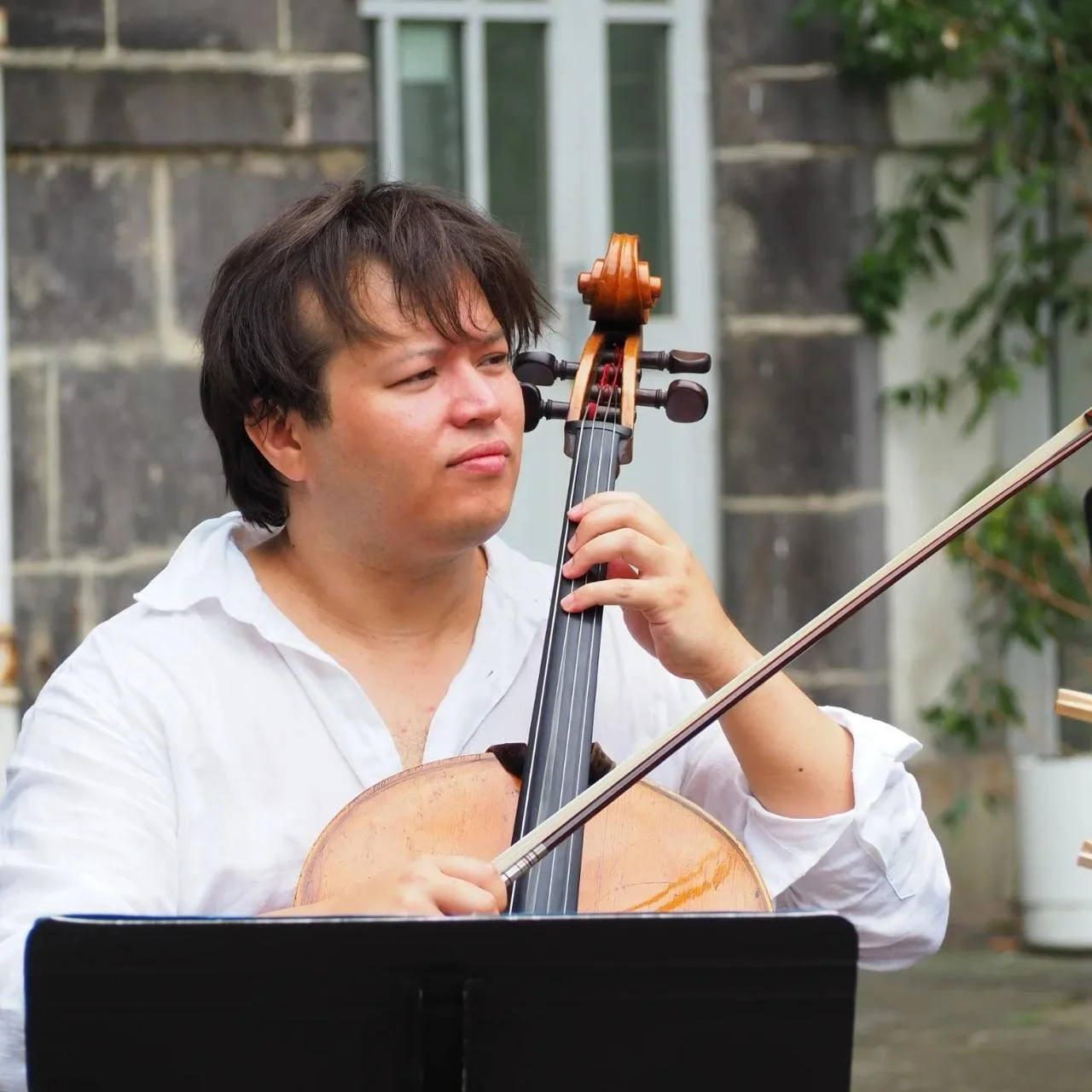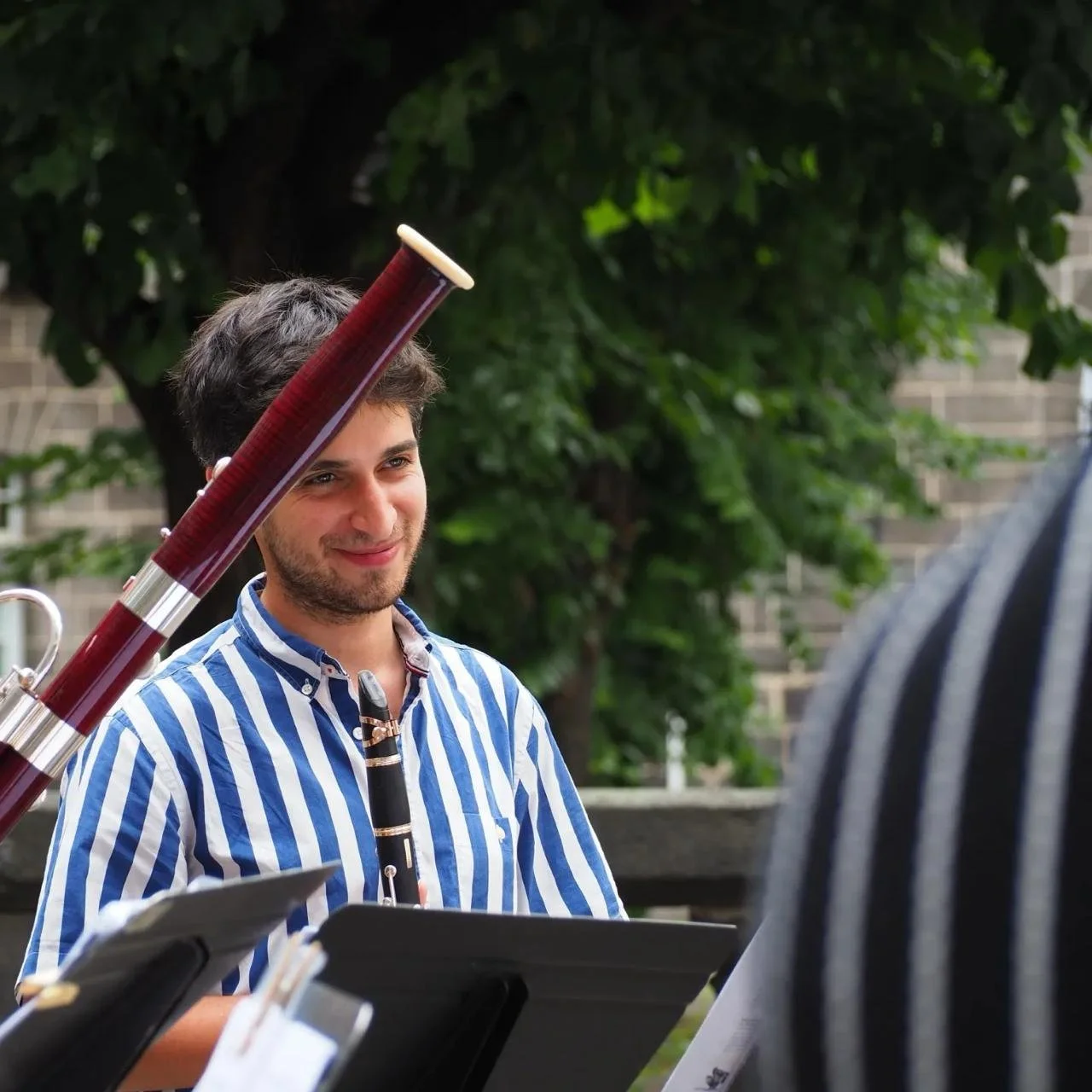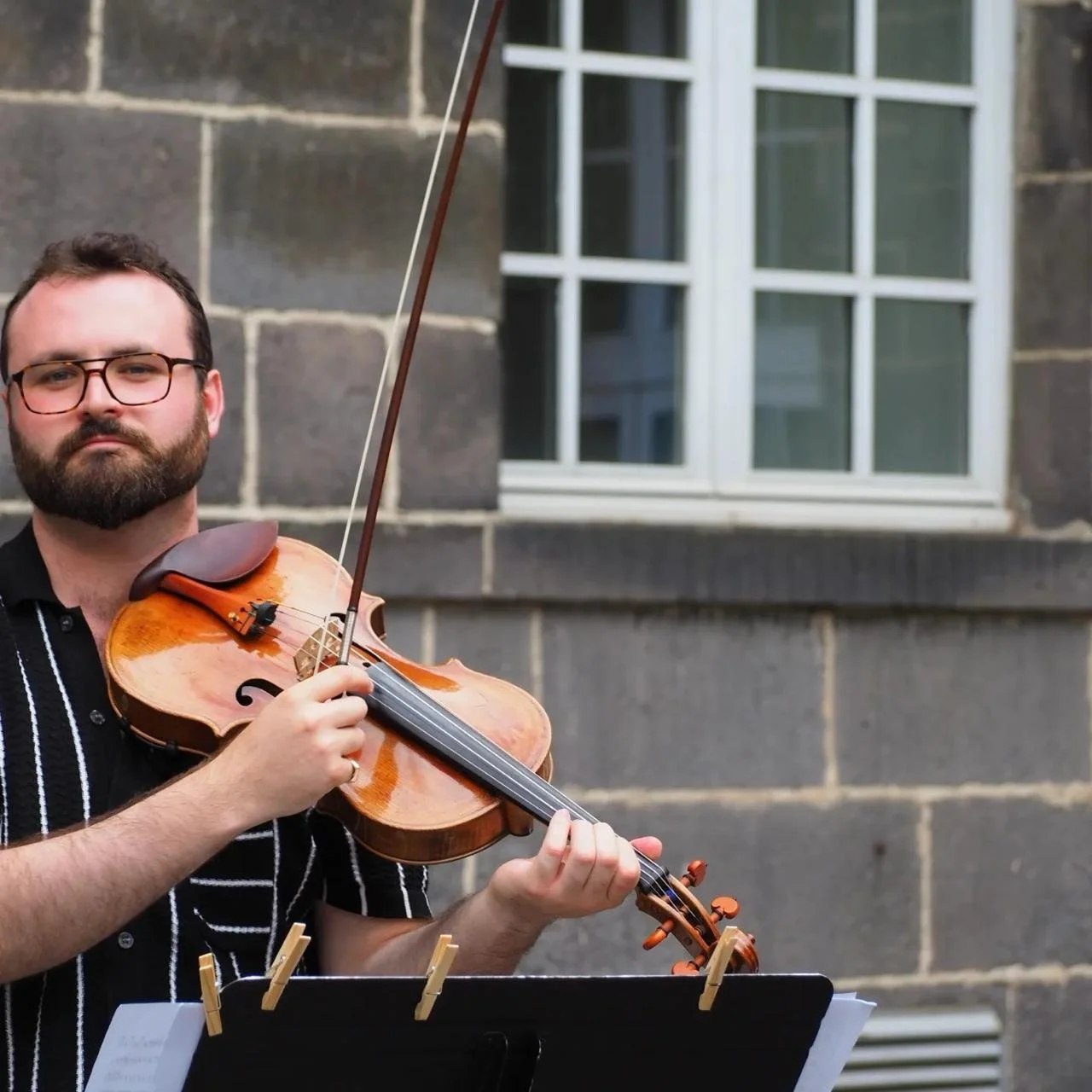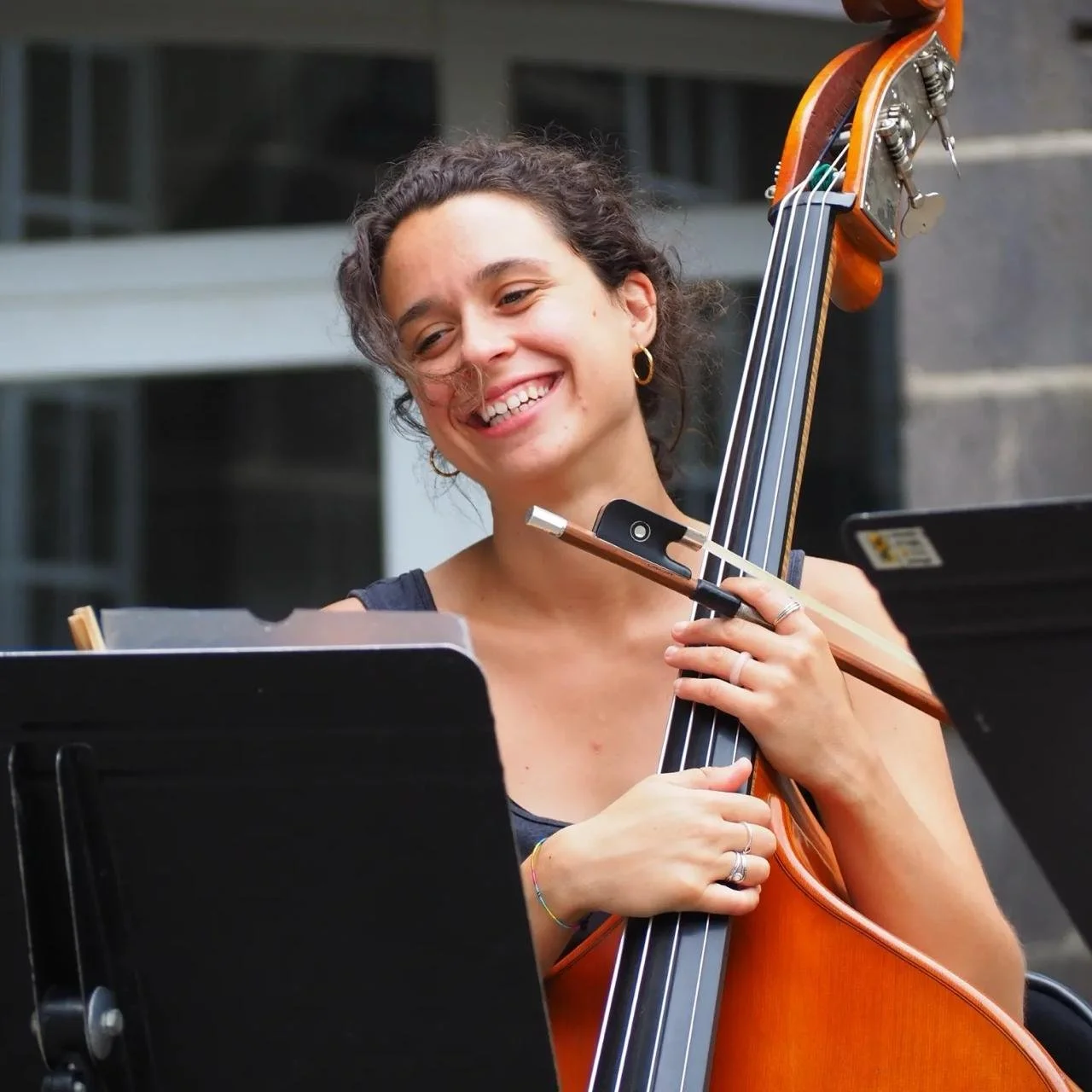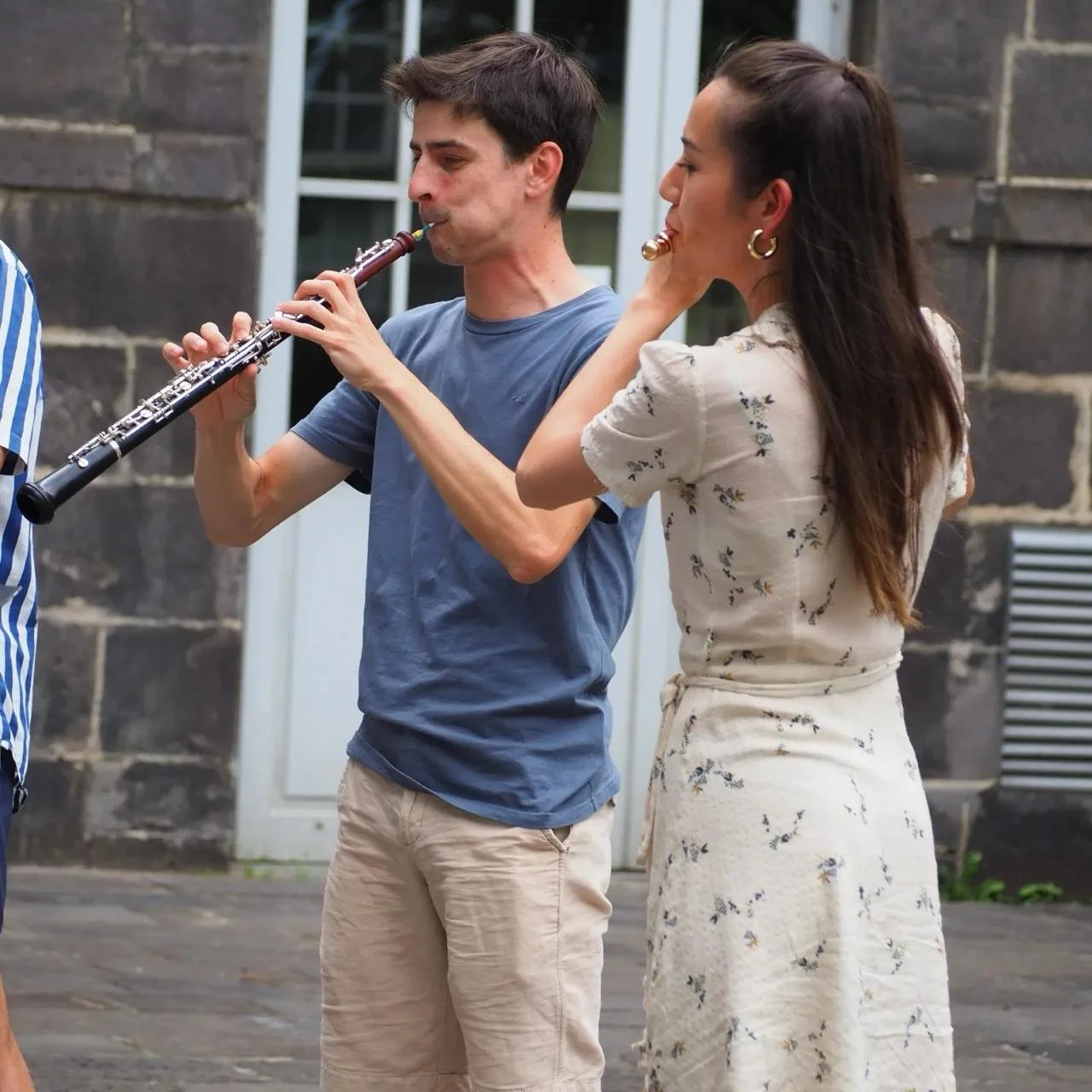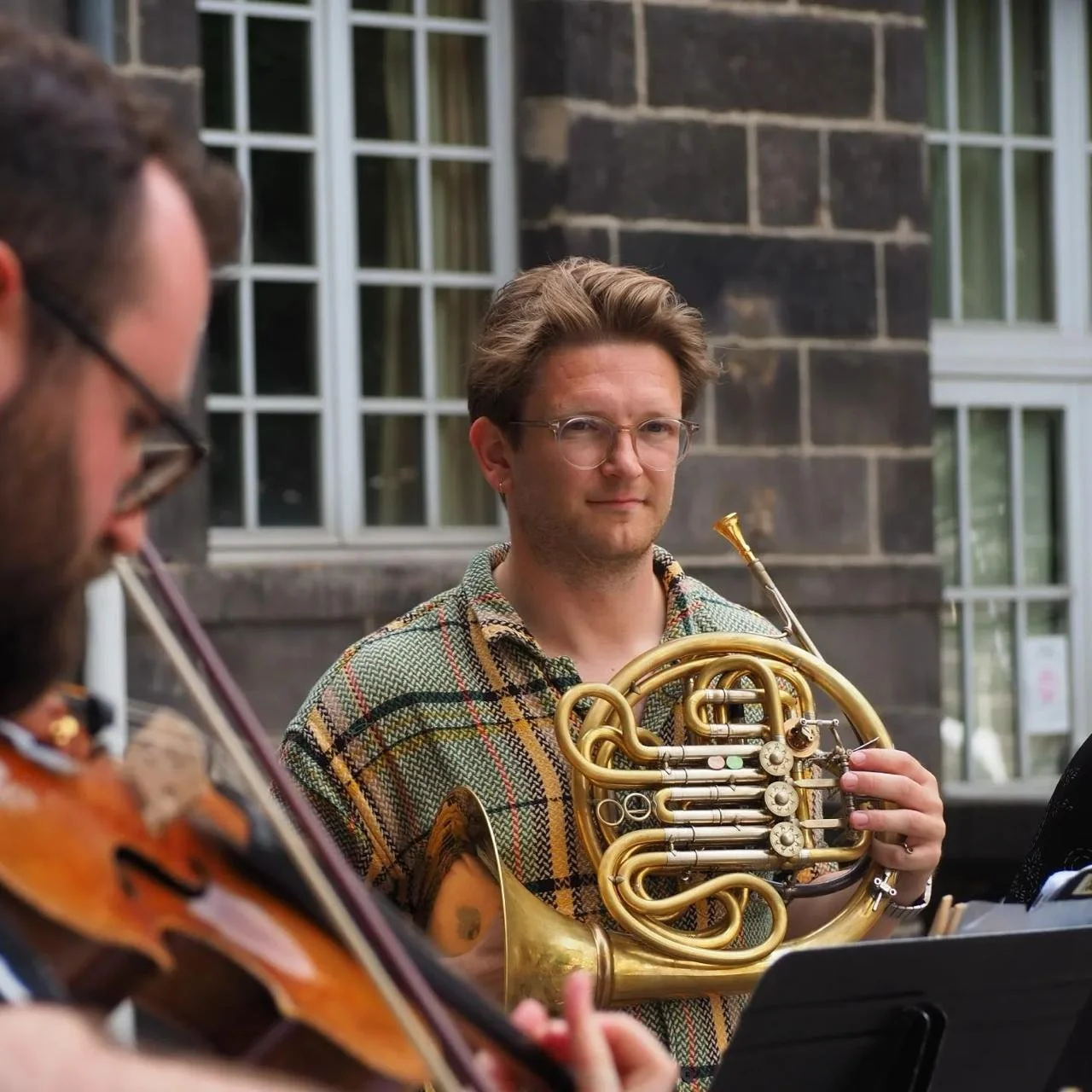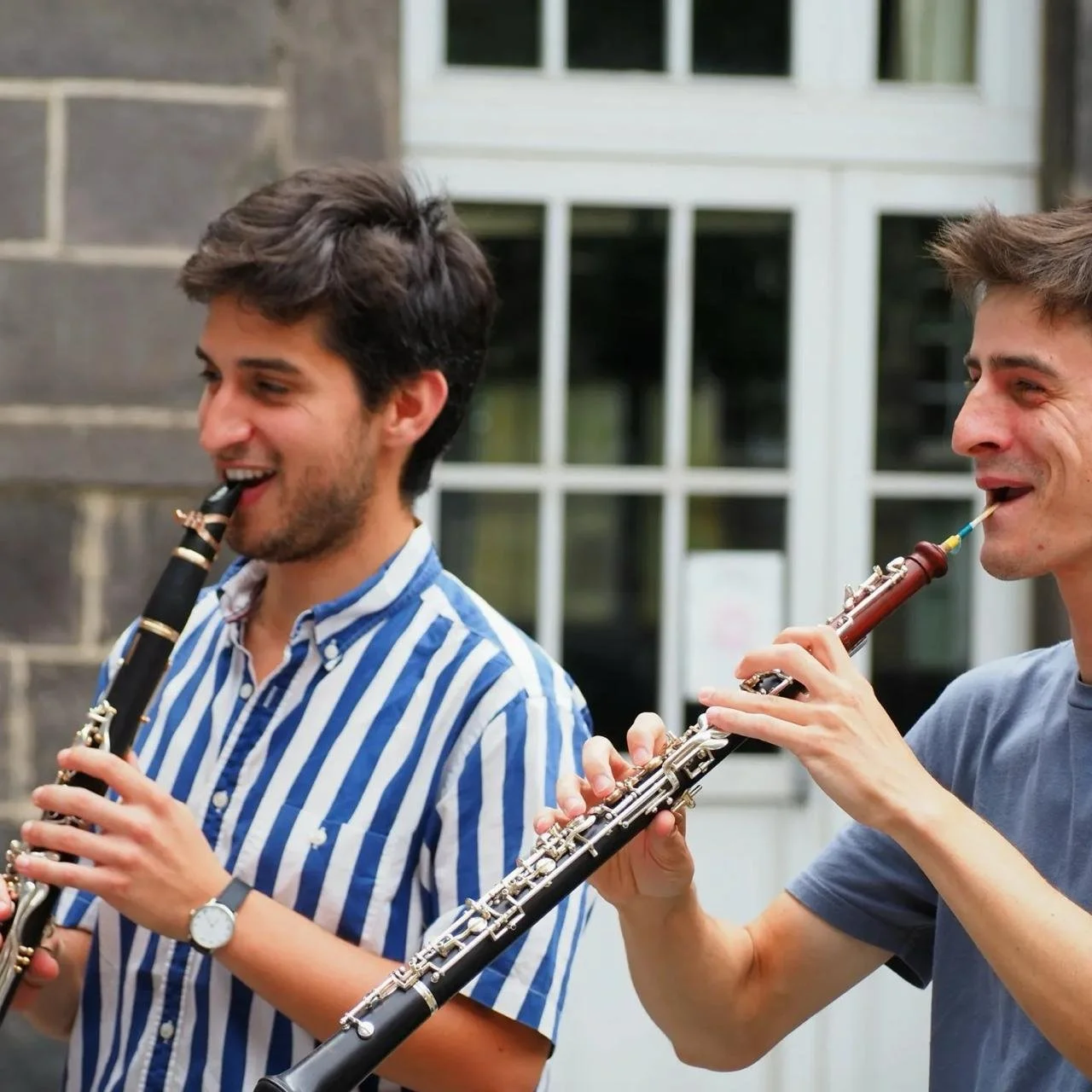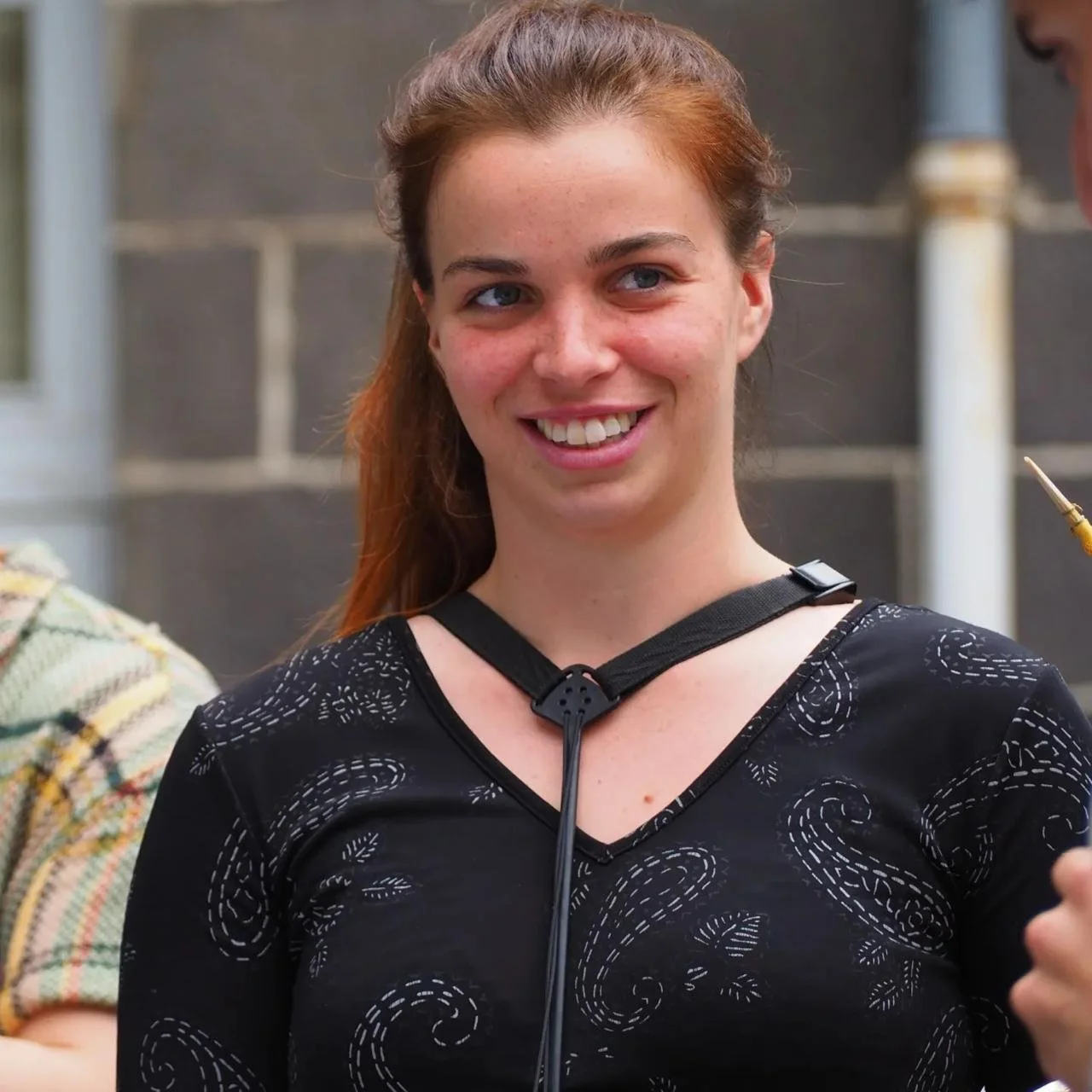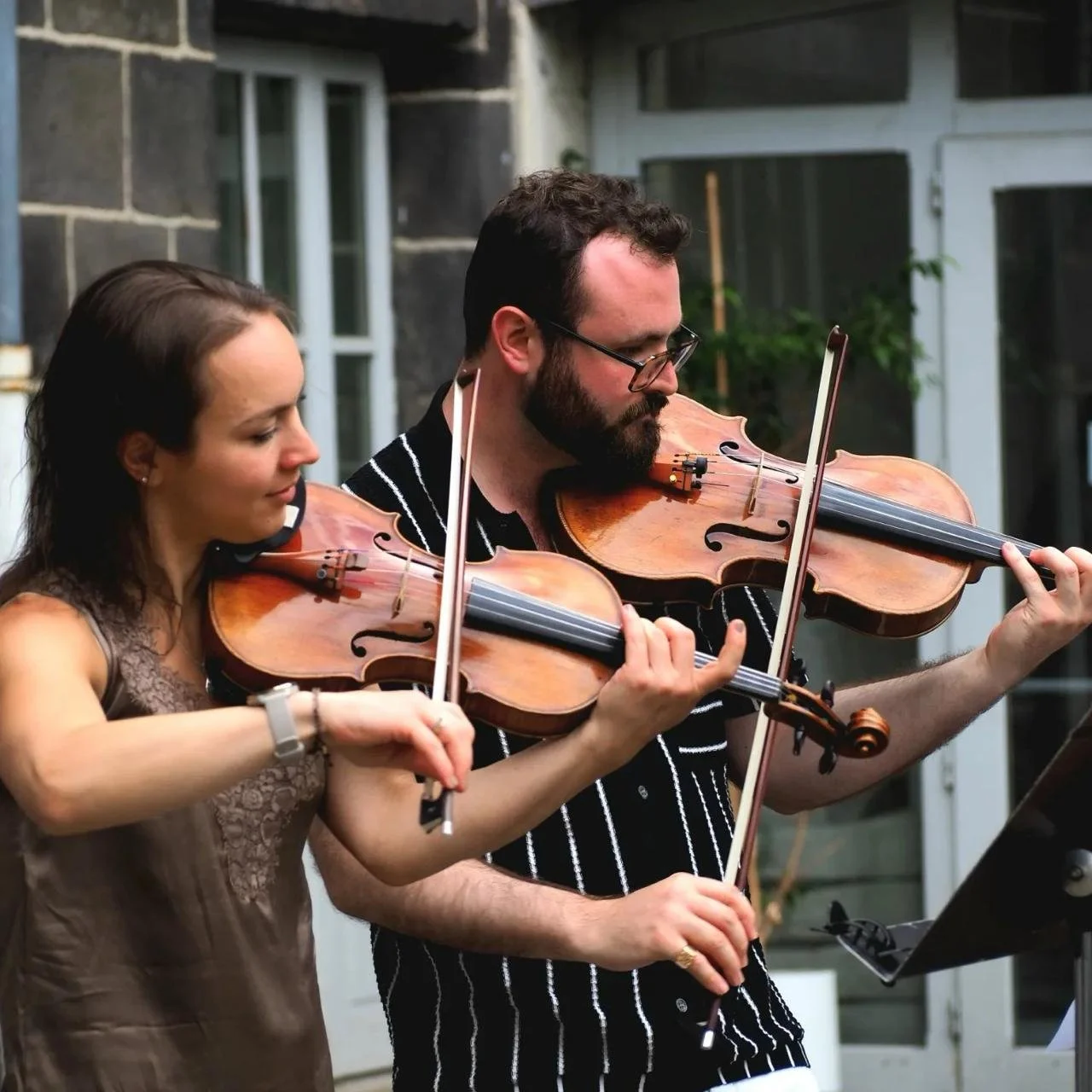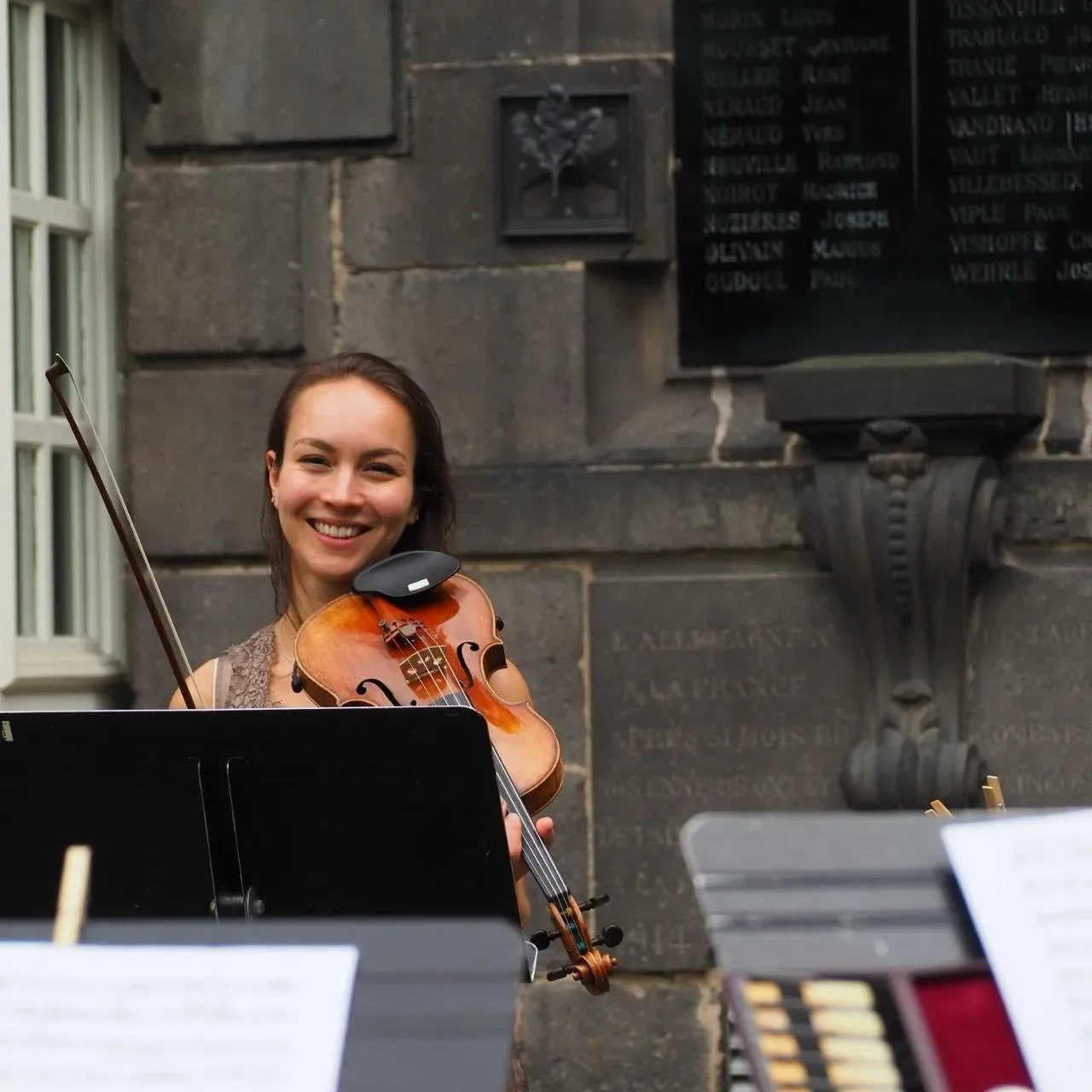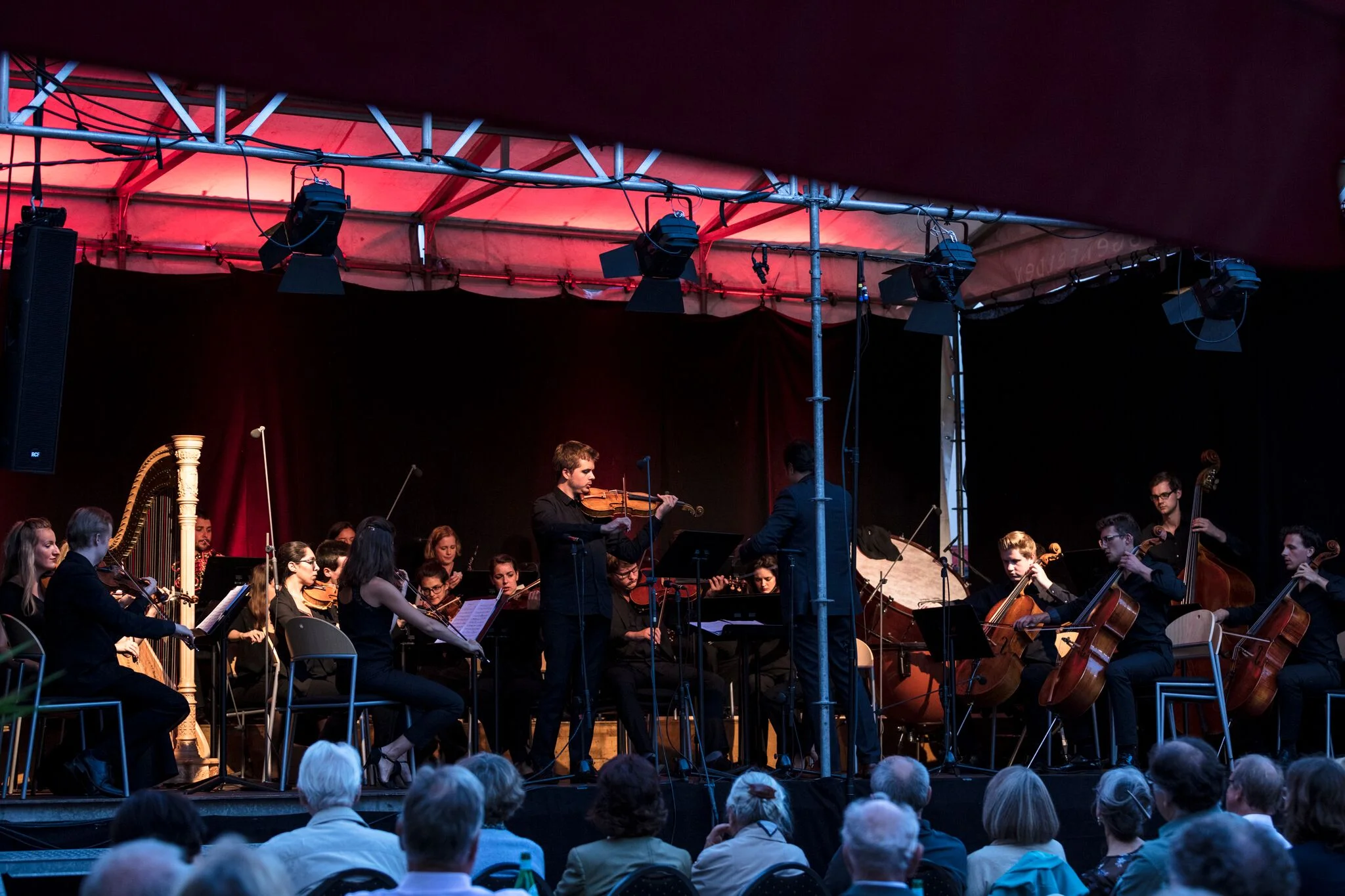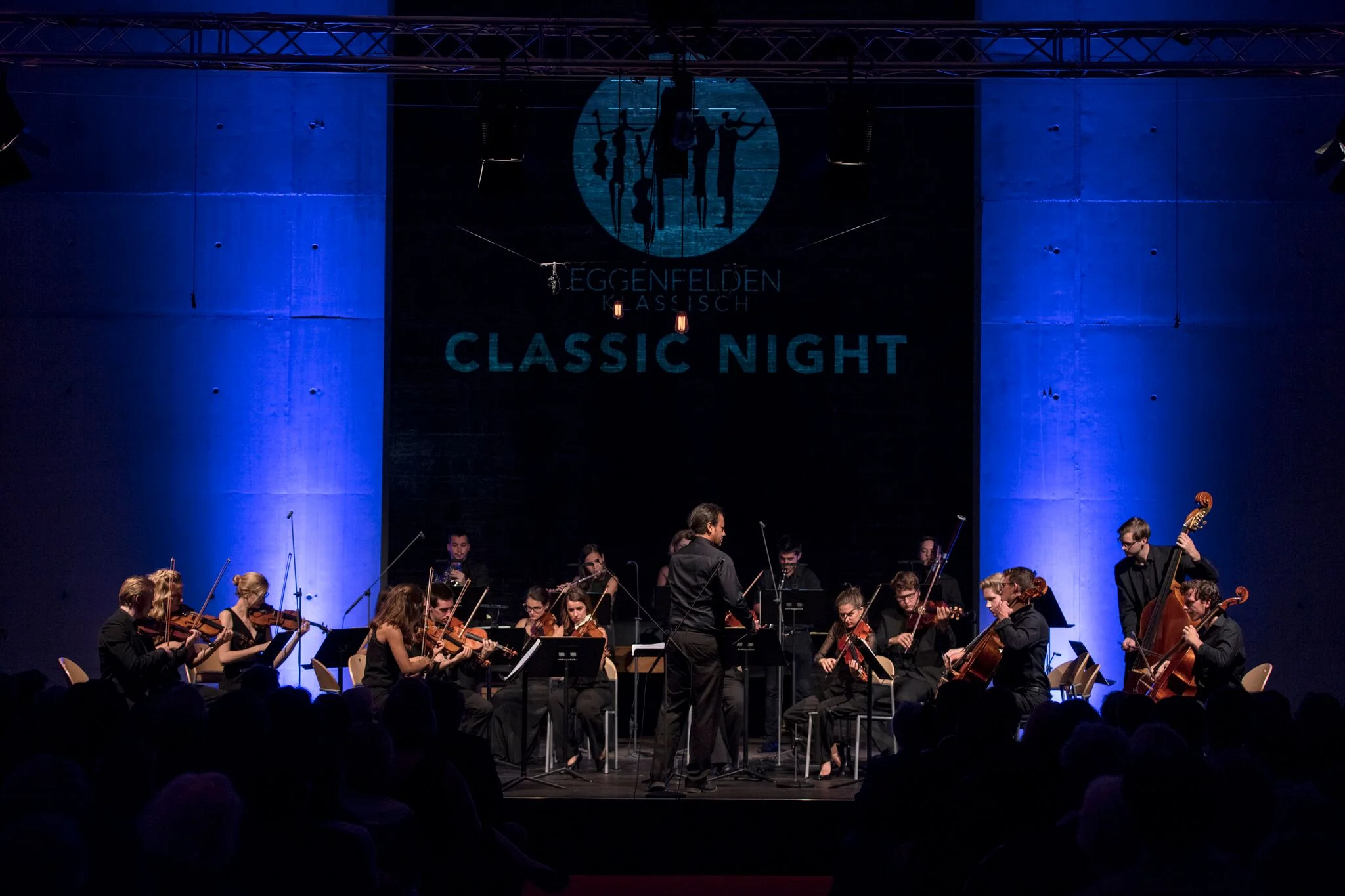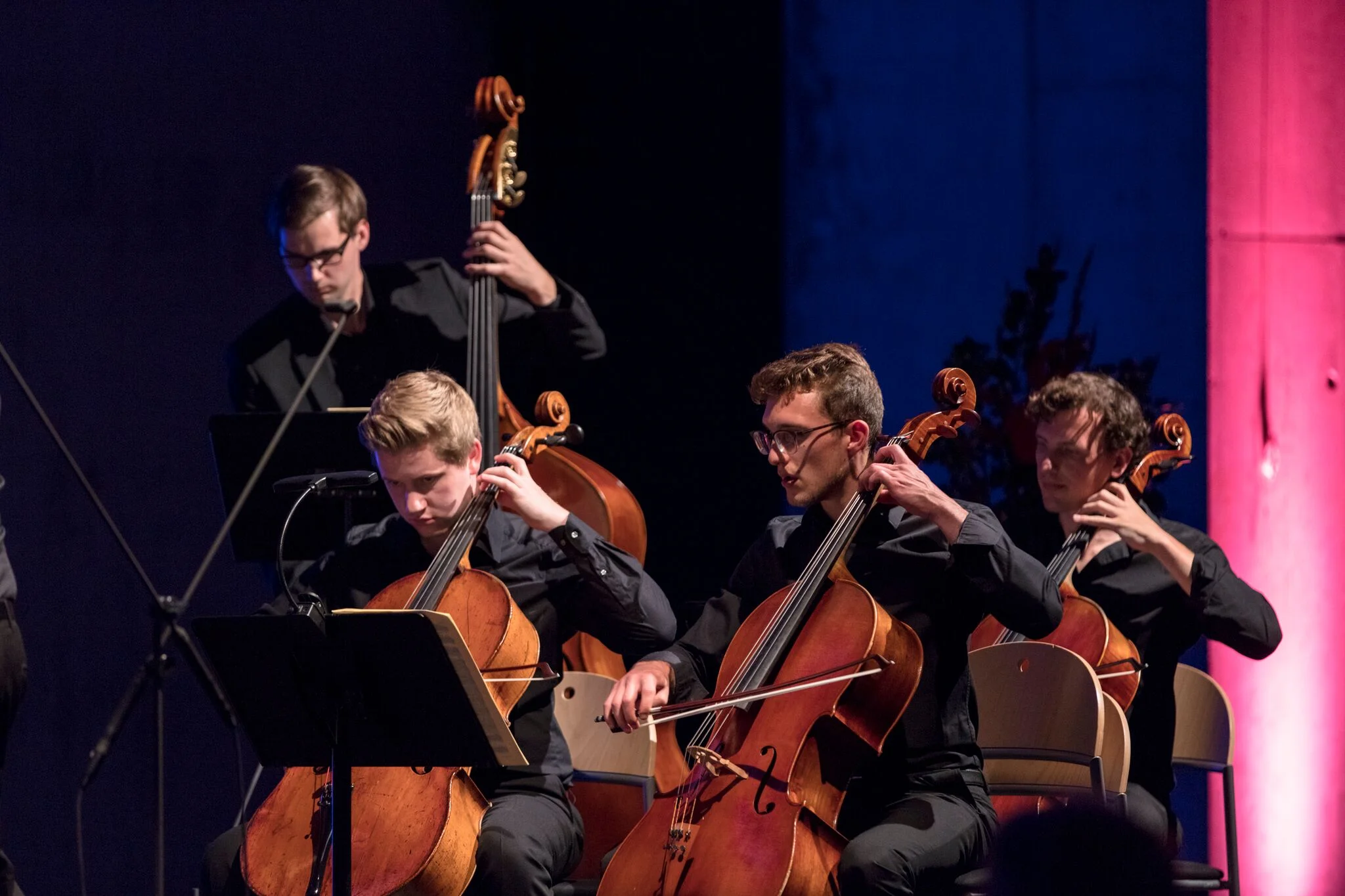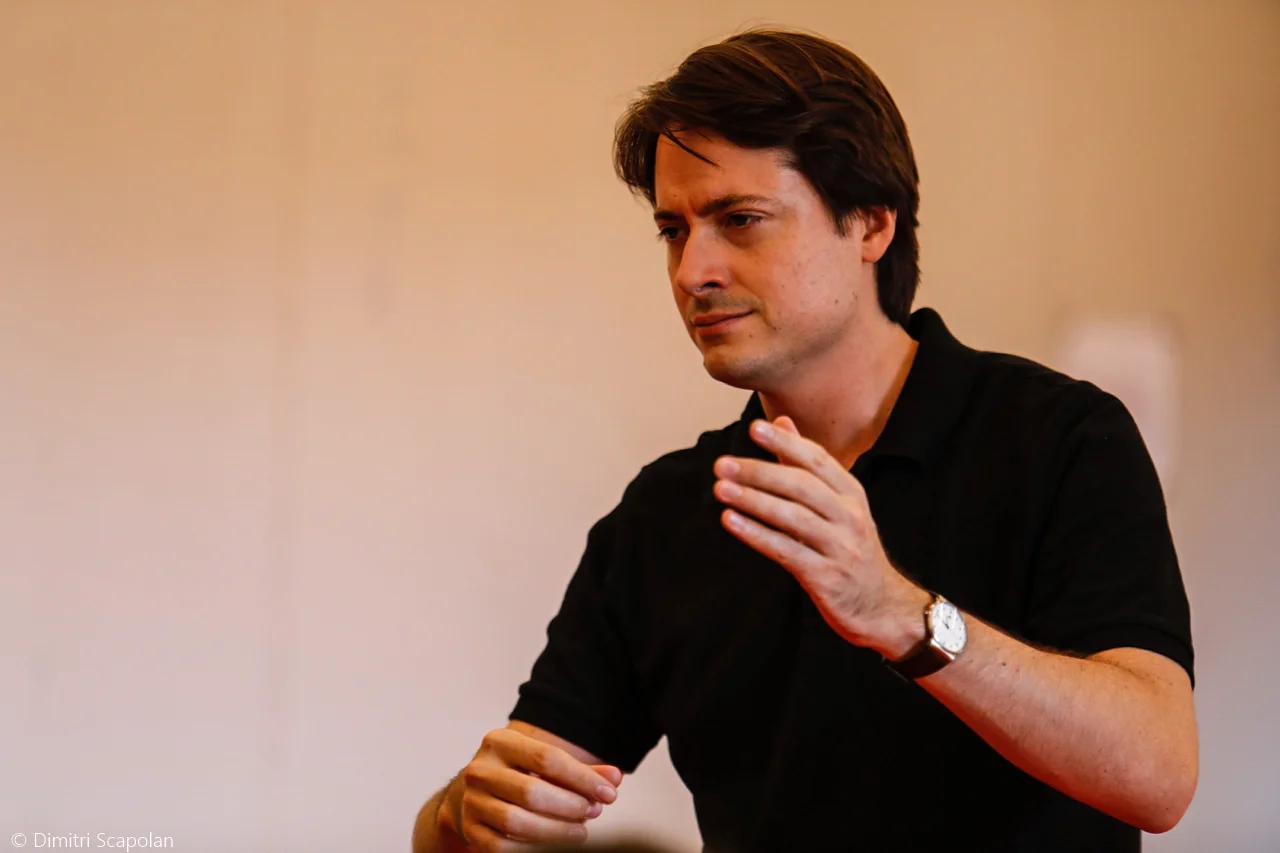Clermont-Ferrand, France — Juillet ‘25
Alma the Artist
A Tribute by the Alma Mahler Kammerorchester
Discover the genius of Alma Mahler, a composer often overlooked in the artistic landscape. A key figure of 1900s Vienna, Alma Mahler left a significant mark on the cultural scene with her unique personality and compositions. Inspiring many artists of her time, she continues to do so today, motivating the AMK to pay tribute to her music.
Through a program blending Lieder and symphonic pieces, from Viennese waltzes to post-Romantic music, the musicians narrate the story of this extraordinary Woman who played a pivotal role among her contemporaries.
In a world premiere, the musicians of the AMK present exclusive arrangements of Alma Mahler’s Lieder and one of her yet-to-be-published compositions.
- Johann Strauss II (arr. Arnold Schönberg) : Kaiserwalzer
- Alma Mahler (arr. Iain Farrington) : Die stille Stadt (1910), Laue Sommernacht (1910), Licht in der Nacht (1915), Erntelied (1915), Hymne an die Nacht (1925)
- Alma Mahler (arr. Iain Farrington) : Einsamer Gang
- Gustav Mahler : Klavierquartett in a-moll
- Alma Mahler (arr. Iain Farrington) : Lobgesang
- Richard Wagner : Sigfried Idyll
Concerts
Thursday 17th July, 7PM: Chapelle de la Fac de Chamalières (Chamalières, France)
Saturday 19 July, 8:30PM: Château du Guérinet (Saint-Priest-Bramefant, France) *Concert preceded by a lecture.
Alma Mahler’s portrait : ©Oskar Kokoschka
Valencia, Spain — December ‘24
GIANTS in miniature
Das Lied von der Erde & Kammersinfonie Nr. 1
“A symphony must contain the whole world” is one of the more overused quotes from Gustav Mahler. He was trailblazing the idea that a symphony should encompass not just the beautiful, poetic, or emotional, but also the ugly, terrifying, and ironic. This idea was novel at the turn of the century in Vienna. “Das Lied von der Erde” certainly represents a whole world through Mahler’s lens. It is a magnificent work, both a symphony and a song cycle, written during a time of great personal crisis for Mahler. Antisemitism forced him to resign as Director of the Vienna Court Opera, his eldest daughter Maria died from scarlet fever, and Mahler himself was diagnosed with a fatal heart defect. "With one stroke," he wrote to his friend, conductor Bruno Walter, "I have lost everything I have gained in terms of who I thought I was, and have to learn my first steps again like a newborn."
Das Lied von der Erde is not a symphony of despair alone. It is a farewell, a departure from mortal life, heavy with grief, love, and sorrow. Like all of Mahler's works, it also has moments of great joy, irony, and humor. To Leonard Bernstein, it was Mahler’s greatest creation. The symphony is an enchanting idealization of the beauties of life on earth, followed by complete resignation. In the composer’s words, “The most personal thing I have ever created.”
At the same time, Arnold Schoenberg was writing his Kammersinfonie Nr. 1. While Mahler was a maximalist, ambitiously attempting to encapsulate the entire world in his music, Schoenberg grappled with the belief that music had reached its ultimate conclusion in terms of tonality, necessitating a complete rethinking of musical structure. He wrote his Kammersinfonie as a reaction to the vast orchestras and hour-long symphonies of the late 19th century. It embodies concision and brevity, a deliberate, purifying response to the expansive nature of Mahler's late-Romantic symphonies. It is only about 20 minutes long and scored for 15 solo instruments. Despite its highly complex tonal language and form, Schoenberg's Kammersinfonie feels like a pocket symphony and is, in many ways, the perfect antithesis to Mahler's Das Lied von der Erde. Both pieces were premiered in 1907 - Mahler's symphony just two days after his death.
The Alma Mahler Kammerorchester owes much to both pieces and both composers. We are forever indebted to the musical language and grand visions of Mahler, often encouraged and inspired by his wife, Alma Mahler. Meanwhile, Schoenberg laid the groundwork for a symphony concept that is condensed and distilled, far removed from Mahler's large symphonic forces, and potentially experienced outside a concert hall.
We would like to invite you to listen to these two symphonies in juxtaposition and experience both their profound contrast but also how they complement each other imperceptibly. One piece revealing a glimpse into the future, and one lamenting the world of yesterday.
Concert
Wednesday December 4, 7.30PM: Palau de la Música (Spain, Valencia)
Clermont-Ferrand, France — July ‘24
XIX In Avernia
On the tomb of Georges Onslow, a composer from Clermont-Ferrand, one can read the following phrase by Hector Berlioz:
“Since Beethoven's death, he has held the reins of instrumental music.”.
The Alma Mahler Kammerorchester explores the musical links between these three composers. Ludwig van Beethoven's Septet, a landmark piece in the chamber music repertoire, resonates with the nascent romanticism of the little-known Nonet (for 9 musicians) by the Auvergne composer Georges Onslow. One of his compatriots from Ambert, Emmanuel Chabrier (this unassuming Auvergne native was nevertheless president of a prestigious Parisian association whose no less prestigious activity can be summed up in its title: ‘La Soupe aux choux d'Auvergne’, Auvergne cabbage soup), left us a piece with Spanish accents following his stay in Andalusia in the autumn of 1882. In a letter to the conductor Charles Lamoureux, Chabrier promised that this piece, with its lively rhythms, would get everyone in the audience on their feet!
A festive, romantic programme that the Alma Mahler Kammerorchester hopes to bring to the Massif Central region, which certainly inspired some of these scores.
Concerts
Friday July 19, 7PM: Chapelle de la Fac de Chamalières (France, Chamalières)
Sunday July 21, 6PM: Domaine Royal de Randan (France, Randan)
Tuesday July 23, 7.30PM: CRR Emmanuel Chabrier (France, Clermont Ferrand)
Clermont-Ferrand, France — July ‘23
Bizet - Dans l’ombre de Carmen
The Alma Mahler Kammerorchester wishes to explore the porosity of styles and cultures. Cultural exchanges have always been an inexhaustible source of inspiration for many composers, considerably enriching their musical language. In our programme "Georges Bizet, in the shadow of Carmen", we wished to take a closer look at the composer.
Although Bizet never knew the success of Carmen during his lifetime, it is now one of the most frequently performed works in the world repertoire, to the point of eclipsing all others. Despite his short life, Bizet nevertheless left us many works that we would like to highlight.
Influenced from an early age by opera and the piano, Bizet composed in 1866 several melodies inspired by poems by the greatest French authors, Victor Hugo, Pierre de Ronsard and Alphonse de Lamartine, which we present here under the title 'Souvenirs d'été'.
Composed ten years after his stay at the Villa Medici and 10 years before writing Carmen, they reveal the composer at the height of his artistic powers. But this talent for melody was already apparent in his very first symphony, composed at the age of 17 and never performed in his lifetime, the Symphony in C. A true example of freshness, grace and clarity, it is this lightness and enthusiasm of youth that we hope to share with the public on these summer nights.
The pocket-sized format proposed - merely 13 musicians - means that this essential piece of the symphonic repertoire can be performed on stages that would be unable to accommodate a full orchestra. This desire to bring symphonic music everywhere is also part of the identity of the Alma Mahler Kammerorchester, which seeks to forge links with all audiences, in order to experience music as something spontaneous, universal and accessible to all.
Concerts
Thursday July 20, 8.30PM : Château du Guérinet (France, Saint-Priest-Bramefant)
Tuesday July 25, 7PM: Maison de l’Oradou (France, Clermont-Ferrand)
Wednesday July 26, 7PM: Maison de St.Jacques (France, Clermont Ferrand)
Friday July 28, 7.30PM: Chapelle de la Fac de Chamalières (France, Chamalières)
Saturday July 29, 8PM: CRR Emmanuel Chabrier (France, Clermont-Ferrand)
© Arthur Stockel
Dresden, Germany — November ’22
Mahler 7 - Dresden
Finally it is time for Mahler‘s 7th Symphony (arranged for chamber orchestra by Klaus Simon) at the beautiful Frauenkirche in Dresden.
During the last two years, the pandemic postponed the event twice but now we are very much looking forward to this concert! “Mahler en miniature” is going to be an intense trip with Leo McFall and 24 musicians through this immense symphony.
Concert
Saturday November 19, 8PM: Frauenkirche (Germany, Dresden)
Clermont-Ferrand, France — July ‘22
Folk Songs
Our project for the summer of ‘22 was called “Folk Songs”.
It featured an exciting program of Luciano Berio’s “Folk songs for 7 musicians and mezzo-soprano” and Antonín Dvořák’s “9th Symphony - From the New World” in an arrangement by the French composer David Walter.
We examined how the human voice and the primal nature of folk songs in Berio’s piece stood up to the composed folklore-inspired symphony by Dvořák. We furthermore saw how the large symphonic work of Dvořák could be explored through these new lenses and in the context of the songs of Berio. We pitched the Old World of Berio against the New World of Dvořák. The European nostalgia of Berio’s song cycle and the American optimism of Dvořák.
Our soloist was the acclaimed German soprano Corinna Scheurle, and our conductor was our always dearly beloved Leo McFall.
We also did important outreach work this summer, teaming up with Maison de l‘Oradou and Maison Nelson Mandela to expose children in the city to our “Folk Songs” project through interactive concerts.
We found this work gratifying to us as an ensemble and on a personal level. We also proved our dedication to the local community we are now a part of. We are determined to make a positive difference in the region, which is our way forward.
© Arthur Stockel
Château du Guérinet, France — July · August ‘21
Magicae
At the crossroads of music, dance and theatre!
For the first time, the AMK has worked with the dancer/choreographer Juliette Rahon on the creation of a completely choreographed new show called “Magicae - Tribulations of a Sorcerer’s Apprentice”.
On stage, a chamber orchestra playing by heart, a conductor and a dancer performed a show of a new kind at the crossroads of music, dance and theater, telling the story of a Sorceress (the dancer), her apprentice (the conductor) and the world they are trying to control (the musicians). Together, and through the music of Dukas, Stravinsky and Debussy, they explored experience, resilience and a new form of harmony.
>>> The premiere took place on August 8, 2021 at the Château du Guérinet in France
Denmark, France, Italy — July ‘19
Mahler 7
Mahler 7 playlist
Alma Mahler Kammerorchester’s first commision!
For its first commission, AMK collaborated with Klaus Simon to give birth to a chamber orchestra arrangement of the monumental Gustav Mahler's 7th Symphony. Mr. Simon is already well established and famous for his arrangements of Mahler's works (including 4 of his Symphonies and numerous songs). His arrangement of the 1st Symphony ("The Titan") also served as the central piece of Alma Mahler Kammerorchester's very first "Genesis" project in 2017.
>>> The world premiere took place on July 15, 2019 in Vendsyssel, Denmark
We continued our tour with performances in France and Italy:
>>> July 18 at the Rencontres Musical Festival in Noyers-sur-Serein, France
>>> July 20 at the Mahler Musik Weeks Festival in Toblach, Italy
This so called "AMK Summer Tour '19" began with a chamber music concert at the Hindsgavl festival in Denmark on July 7, with works by Bartók, Connesson, Hindemith and Wagner.
With Klaus Simon after our "Nature vs. Industry" concert in Ochsenhausen in July 2018 (10th from the left, standing).
Ochsenhausen, Germany — March ’19
Bruno-Frey-Musikpreis
Since 1993, the Bruno Frey Music Prize of the Bruno Frey Foundation has been closely linked to the work of the Landesakademie in Ochsenhausen. Every year, the Foundation and the Landesakademie award the prize to one or more outstanding up-and-coming artists or ensembles, which is considered one of the most highly endowed music awards in Baden-Wuerttemberg. In its history, the Bruno Frey Music Prize has been awarded to, among others, the Junge Deutsche Philharmonie, the violinist Linus Roth and the piano duo Aline and Nicolay Shalamov.
We are extremely honoured that the jury for 2019 Bruno-Frey-Musikpreis chose our chamber orchestra to be one of the winners of this prestigious prize!
After the prize ceremony in Ochsenhausen, Germany. Starting from left, behind: François-Xavier Leroy, Andrej Kapor, Chloé Dufossez, Mathilde Lauridon, Matic Kuder. Simen Fegran, Todor Markovic, Asbjørn Ibsen Bruun and Oscar Hagen.
Zürich, Switzerland — February ’19
Zürich Fundraiser
The Alma Mahler Kammerorchester came to Zürich for its first fundraising chamber music concert!
Program:
Ferdinand Ries - Sextet op.142 for harp, clarinet, horn, bassoon, double bass and piano
Francis Poulenc - Trio for oboe, bassoon and piano
Astor Piazzolla - Histoire du tango, Café 1930
Richard Strauss - Till Eulenspiegel, einmal Anders! for violin, double bass, clarinet, bassoon and horn.
We are very thankful to our audience and everyone donating and thus helping our ensemble!
Eggenfelden, Germany — September ’18
Eggenfelden Festival
The Alma Mahler Kammerorchester is delighted to have been invited as Ensemble in residence at the Eggenfelden classic festival. Collaborating with the Peruvian conductor Arturo Alvarado, we had the opportunity to perform 3 different programs on three occasions: September 6 (Rossini, Bruch, Saint-Säens, Mozart), September 8 (Bach, Schubert, Solima) and finally September 9 for the final concert of the festival (Schoenberg, Schoeck, Popper, Saint-Säens). Soloists joining us for these concerts were: Larissa Cidlinsky, William Hagen (violin), Anuschka Cidlinsky, Adrien Boisseau (viola) and Anton Spronk and Aurélien Pascal (cello).
We are very thankful to have been part of this up-and-coming festival and thank the staff for their warm welcome and smooth organisation!
Ochsenhausen, Germany — July ’18
Nature vs. Industry
Nature vs. Industry playlist
For its summer residency, the Alma Mahler Kammerorchester was working on a new program entitled "Nature vs. Industry" featuring works by Hindemith, Wagner, Connesson and Debussy. This program aimed to deal with the loss of innocence and the conflicting nature of these two realms. We wanted the performance to go beyond just the musical experience and bring a reflection on what is both a sociological and philosophical issue.
We collaborated again with J.Blanch productions and recorded brand new videos. Check them out on our YouTube channel!
Leo McFall again conducted our big summer project, taking place in Ochsenhausen, Germany. This town is also known as the "Baroque Kingdom of Heaven" (Himmelreich des Barock), for it was in the Baroque era, that music and sciences proliferated here. Today, it is home to the Landesakademie Ochsenhausen, which regularly hosts various chamber music groups – not unlike ourselves – and welcomes audiences for numerous concerts throughout the whole year.
The members of the Alma Mahler Kammerorchester after our recording session in Ochsenhausen.
Vienna, Austria — January ’18
Danses Profanes
What better place than Vienna, city of Alma Mahler herself, for our second residency?
It was an honour to perform in this culturally rich city which has always been a meeting place for numerous artists, such as Gustav Klimt, Oskar Kokoschka, Alban Berg, Gustav Mahler, Arnold Schoenberg, Stefan Zweig, and so many others.
We aimed to rediscover the "classical" repertoire, this time with works by Debussy, Dvořák, Martinů, Poulenc and Ravel, in surprising chamber music settings:
Gustav Klimt - The Dancer
Claude Debussy
Danse sacrée et danse profane
Antonín Dvořák
Bagatelles, Op. 47
Francis Poulenc
Trio for oboe, bassoon and piano
Bohuslav Martinů
Quartet in C-Major for clarinet, horn, cello and side drum
Maurice Ravel
Pavane pour une infante défunte for flute and harp
Maurice Ravel
Ma mère l'Oye [arr. David Walter]
You're not reading incorrectly: no "Strauss waltzes", but "Danses Profanes" for this New Year’s concert!
We would like to thank the KLAVIERgalerie and our plentiful audience for their warm welcome!
Villa Manin, Italy — July ’17
Genesis
Genesis playlist
In July 2017, Alma Mahler Kammerorchester had its first residency in Villa Manin in Italy, which marked its musical birth – its genesis. Together, we performed four concerts in this beautiful venue, all of which were very enthusiastically received by the audience – our two orchestral concerts were sold out.
The first of the two major programmes we played was baroque – in collaboration with Carlo de Incontrera – dedicated to the life of Johann Winckelman and Maria Theresa of Austria. We were incredibly happy to have collaborated with the wonderful singer Bettina Ranch, who joined us for this concert, and also travelled with us for its second performance in the Teatro Verdi in Trieste.
The second programme, subtitled Genesis, involved two pieces by Richard Wagner and Gustav Mahler: Siegfried Idyll and the 1st symphony (in an arrangement by Klaus Simon) respectively. We are very grateful to Leo McFall, who conducted us during both of these projects.
Last, but not least, we performed two open-air chamber music concerts in the park of the Villa: a string quartet program with pieces by Mozart and Haydn, and a woodwind program with pieces by Janáček, Ligeti, Piazzolla, Shostakovich and Zemlinsky.
After an extremely successful beginning, we are very much looking forward to our next projects which include chamber music and reductions of orchestral repertoire.
Piazzolla in the park of Villa Manin.
Leo McFall in a rehearsal.















